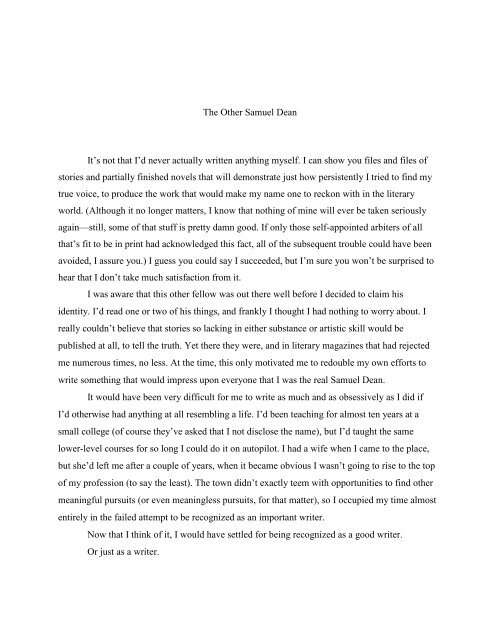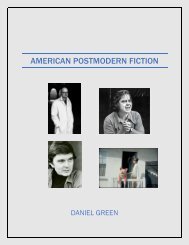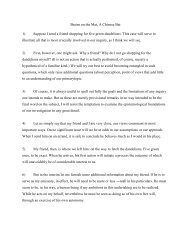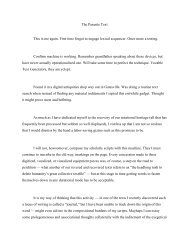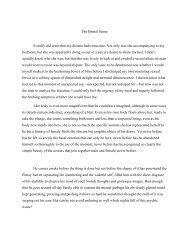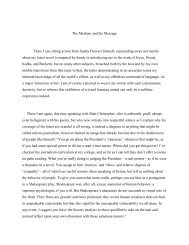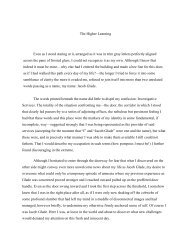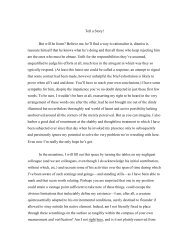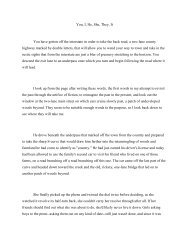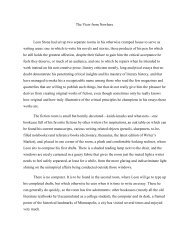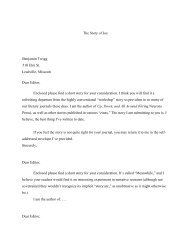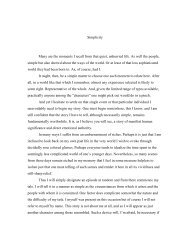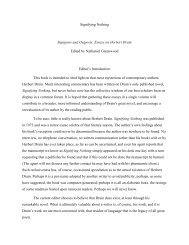Samuel Dean
Create successful ePaper yourself
Turn your PDF publications into a flip-book with our unique Google optimized e-Paper software.
The Other <strong>Samuel</strong> <strong>Dean</strong><br />
It’s not that I’d never actually written anything myself. I can show you files and files of<br />
stories and partially finished novels that will demonstrate just how persistently I tried to find my<br />
true voice, to produce the work that would make my name one to reckon with in the literary<br />
world. (Although it no longer matters, I know that nothing of mine will ever be taken seriously<br />
again—still, some of that stuff is pretty damn good. If only those self-appointed arbiters of all<br />
that’s fit to be in print had acknowledged this fact, all of the subsequent trouble could have been<br />
avoided, I assure you.) I guess you could say I succeeded, but I’m sure you won’t be surprised to<br />
hear that I don’t take much satisfaction from it.<br />
I was aware that this other fellow was out there well before I decided to claim his<br />
identity. I’d read one or two of his things, and frankly I thought I had nothing to worry about. I<br />
really couldn’t believe that stories so lacking in either substance or artistic skill would be<br />
published at all, to tell the truth. Yet there they were, and in literary magazines that had rejected<br />
me numerous times, no less. At the time, this only motivated me to redouble my own efforts to<br />
write something that would impress upon everyone that I was the real <strong>Samuel</strong> <strong>Dean</strong>.<br />
It would have been very difficult for me to write as much and as obsessively as I did if<br />
I’d otherwise had anything at all resembling a life. I’d been teaching for almost ten years at a<br />
small college (of course they’ve asked that I not disclose the name), but I’d taught the same<br />
lower-level courses for so long I could do it on autopilot. I had a wife when I came to the place,<br />
but she’d left me after a couple of years, when it became obvious I wasn’t going to rise to the top<br />
of my profession (to say the least). The town didn’t exactly teem with opportunities to find other<br />
meaningful pursuits (or even meaningless pursuits, for that matter), so I occupied my time almost<br />
entirely in the failed attempt to be recognized as an important writer.<br />
Now that I think of it, I would have settled for being recognized as a good writer.<br />
Or just as a writer.
2<br />
I’m told he was really an inoffensive sort. Of course now our names have become<br />
inextricably linked and our identities practically merged together, but I know almost nothing<br />
about him. If he’d discovered what I was up to I’m sure he would have done whatever he could to<br />
rescue his reputation while it was still worth something. Maybe he would have changed his name.<br />
It’s quite likely there will still be questions about the authenticity of what he really did publish<br />
under his own name before it became attached to the scandal we’re talking about.<br />
There’s no doubt my actions have cast a shadow over his career as well, for what it’s<br />
worth— although admittedly my career was enveloped in a dreadful darkness to begin with.<br />
I guess I didn’t truly believe it would work. I always assumed that one’s efforts were<br />
judged on their own merits, and simply alluding to one’s already published body of writings or<br />
hinting at the esteem with which one is already held in certain circles was a vain gesture at best. I<br />
suppose I knew that fashion, name-dropping, and plain influence-peddling were as prominent in<br />
the literary world as in any other domain, but if you have always regarded “literature” as the<br />
incarnation of ultimate value—which I had, as hard as that might be to believe: did I not cheapen<br />
the image of literature by what I subsequently decided to do?—you abandon your illusions with<br />
the greatest reluctance. It took a long time for me to finally part company with those illusions,<br />
and even then my ultimate ambition was still to find recognition for my own work on its own<br />
terms, as literary art.<br />
It was a lark, an experiment. What would happen if I claimed to be another writer, one<br />
more amply published, but whose name and mine just happened to be the same? I tracked down<br />
all of <strong>Samuel</strong> <strong>Dean</strong>’s published fiction (he had yet to publish any books, which I don’t think I<br />
would have had the temerity to claim as mine), as well as the small handful of “creative” essays<br />
he’d written, listed every one of them in a cover letter as among my own previous publications,<br />
and submitted a story I’d recently finished to a journal I picked more or less at random. It was<br />
turned down, but with the politest letter of rejection I’d ever received, so I resubmitted to another<br />
journal, where it was accepted.<br />
It’s testimony to how few people read these small publications that, as far as I could tell,<br />
no one, including <strong>Samuel</strong> <strong>Dean</strong>, took notice of what I’d done. Anyone familiar with Mr. <strong>Dean</strong>’s<br />
writing should have noticed that my story bore no resemblance to his work at all. He wrote<br />
delicate, finely-wrought stories about delicate, finely-wrought characters whose circumstances
3<br />
were detailed in delicate, finely-wrought scenes. (I do not intend to belittle Mr. <strong>Dean</strong> in using<br />
these terms. This was the honest impression the stories made on me.) Incident was clearly not the<br />
author’s forte, but rather the precise rendering of the inner response to ongoing events was his<br />
aim. My story, on the other hand, was crude and comical, completely lacking in subtlety or<br />
refinement. It was called “Mango Girls.” This is how it began:<br />
I prowl around looking in people’s windows. You’d be surprised at the things I<br />
see. Like those guys who held us up that night. But I’m getting ahead of myself. I ought<br />
to tell you some things about the place where I work.<br />
It’s called the Starview Drive-In. Not a very clever name, I’ll admit, but we don’t<br />
go so much for cleverness around here. I work there four nights a week, from April to<br />
October. I used to work seven, but since the new management took over they cut back<br />
my hours. I can’t say I was happy, but what can you do? The extra money would have<br />
come in handy the rest of the year, when I go to this new community college they just<br />
built.<br />
But I’m talking about myself, and I said I was going to tell you about the<br />
Starview. It’s the kind of drive-in where they show these R-rated sex pictures. You know,<br />
the ones with titles like The Pep Squad, or Backwoods Boobs, or The Girls from<br />
S.N.A.T.C.H. They’re usually full of horny teenagers, and the object seems to be to<br />
undress as many of the girls as possible by the end of the movie. They draw big crowds,<br />
so I guess I’m no judge of movies. I don’t watch them, anyway. There are more<br />
interesting things to watch at a drive-in than the movie.<br />
The story goes on to relate a few of the narrator’s more interesting observations. The<br />
crowd at the drive-in becomes a kind of microcosm of this small community in which the<br />
narrator lives. But he seems to hover outside it, a perpetual onlooker who never feels a part of the<br />
life he regards from a distance. It’s an ambitious conceit, I’ll admit. But I’d like to think my<br />
work has something to say. It’s not precious and etiolated. Like so much of what gets published<br />
these days. (Again, I don’t mean to cast aspersions on <strong>Samuel</strong> <strong>Dean</strong>. Obviously his fiction does<br />
what it does well enough. It’s just not my kind of writing.)
4<br />
No doubt the differences between his work and mine (that is, my work as distinct from<br />
those of his works I claimed to be mine) reflect a more deep-seated difference in background and<br />
experience. All writers draw on their own lives for the characters and events they portray—<br />
although some call attention to this fact more blatantly than others—and mine makes its way into<br />
the fiction I write almost despite myself, as if invention inevitably drifts to the already known<br />
and flights of fancy must mask themselves in the familiar and the near at hand. (Readers coming<br />
upon these now reviled stories falsely attributed to “<strong>Samuel</strong> <strong>Dean</strong>”—but how could it be false? I<br />
am <strong>Samuel</strong> <strong>Dean</strong>!—those readers will surely notice how often the protagonists are given names<br />
that ring changes on that notorious appellation—e.g., “Daniel Green.”) I was born in a small<br />
mining town in Missouri, raised by parents who struggled to maintain a place in the lower<br />
middle class (my father delivered Wonder Bread, in case you’re wondering), and because we<br />
could not afford to send me off for all four years to a university attended a junior college called,<br />
believe it or not, Mineral Area College. Even when I’m not at all conscious of expressing the<br />
outlook of someone molded by such circumstances, I do so nevertheless.<br />
As I said before, I’m not really familiar with Mr. <strong>Dean</strong>’s history. I intended only to<br />
appropriate his reputation, not his identity. But certainly the impression one would get if one<br />
assumed that his fiction was a disguised account of his own life—reading from the literary to the<br />
literal—is that he must have grown up in comfortable surroundings, probably went to a<br />
wellheeled college, was used to consorting with all the best people, didn’t have to rely on a job<br />
teaching ill-prepared teenagers wholly unappreciative of his efforts in order to support himself<br />
while pursuing his ambition to write. So you see, I could not simply have tried to imitate his<br />
work. Not only would it have given me no satisfaction to be recognized for writing like someone<br />
else, but I could never have learned to inhabit this alien world from which his stories emerged.<br />
Of course, I don’t mean to minimize my offense. Whether or not my stories were really<br />
better than his (other people have told me that, you know), I should have left well enough alone.<br />
Maybe no one would have ever discovered my act of authorship piracy. Maybe a hundred years<br />
from now some desperate academic calling himself a “<strong>Dean</strong> scholar” would have come across<br />
this uncollected work in the only extant copy of the obscure journal in which it appeared and<br />
would have attempted to show how it completely transformed the established view of the <strong>Samuel</strong><br />
<strong>Dean</strong> corpus. More likely it would have literally passed beyond anyone’s notice once the last
5<br />
library was torn down and replaced by a video arcade. However, the thrill I expected to feel upon<br />
finally seeing my work in print was less intense than I’d anticipated it might be—was, in fact,<br />
hardly a thrill at all. I don’t think my response was at all the result of lingering guilt about having<br />
gotten into print under false pretenses. This was, in fact, my work; I had merely used an<br />
admittedly dishonest ruse to help bring attention to it, attention it couldn’t have received on its<br />
own. That it wasn’t likely to attract much attention after all undoubtedly influenced my next<br />
move, but I now realize it was both more and less than simple attention I wanted. All those<br />
stored-up manuscripts represented everything I could claim as accomplishments in what passed<br />
for my life. To have these accomplishments acknowledged was apparently urgent enough that I<br />
could not be content with one measly publication, even if it meant continuing to pretend I<br />
belonged to another life altogether.<br />
In total I managed to publish seven stories using <strong>Samuel</strong> <strong>Dean</strong> as my alias. I also<br />
procured an agent, who helped me interest a publisher in one of my unfinished novels that I<br />
presented as a work-in-progress. The editor assigned to evaluate this manuscript called it<br />
“intelligent, well-crafted, and thought-provoking,” although when the first story exposing my<br />
foul deeds appeared she hadn’t yet definitely declared an intent to publish it. (Curiously enough,<br />
she informed me that as an editorial assistant she believed she had come across one of my<br />
previous manuscripts—the publishing house had ultimately passed on it—and thought that this<br />
new work was significantly better. Had she read a submission from my namesake, the other<br />
<strong>Samuel</strong> <strong>Dean</strong>? Or had she confused both of us with someone else whose novel was reminiscent<br />
of mine or whose name was, God forbid, similar to ours?) Of course, by this point I could attest<br />
to publications I had truly authored (and, after all, I was <strong>Samuel</strong> <strong>Dean</strong>), but I still felt the need to<br />
affirm the more extensive and additionally impressive pedigree of my association with “<strong>Samuel</strong><br />
<strong>Dean</strong>.” There was in fact something enjoyably subversive about continuing the masquerade even<br />
when it might no longer be necessary, and could even prove disastrous, as it surely was fated to<br />
be. You would be well-justified in thinking I wanted to get caught, although I assure you I did<br />
not.<br />
If you’d take the time to read those stories, I think you’d find they weren’t just knockoffs,<br />
formula pieces thrown together to take advantage of the newly acquired cachet I’d borrowed<br />
from the other <strong>Samuel</strong> <strong>Dean</strong>. Indeed, I think you’d kind them carefully constructed and full of a
6<br />
unsentimentalized compassion for the unlucky and mildly bewildered characters they portray—<br />
only mildly bewildered, because they don’t believe themselves to be utterly unworthy of a larger<br />
portion of the world’s provisions, yet don’t quite comprehend why it remains unobtainable<br />
despite their best efforts. There are, for example, the straight-laced, right-thinking citizen (“Bob<br />
the Baptist”) who watches helplessly as his previously devout and docile wife becomes a wanton<br />
adulteress, the small-town talk show host who knows he’s worthy of better things but who must<br />
deal with the petty problems of his hopelessly provincial listeners, the young man who watches a<br />
book store owned by his former teacher go up in flames and subsequently comes to suspect that<br />
his own mother might have been among those responsible for enkindling the conflagration. All<br />
of these stories are set in the same small Midwestern town, a town I called “Castor.” I won’t say<br />
that my intention was exactly Faulknerian (and certainly not that my accomplishment could bear<br />
comparison with Faulkner’s), but I will admit to the ambition of creating a convincingly<br />
rendered, self-enclosed, fully realized fictional “world” that would be a credible enough<br />
imitation of the real thing a reader wouldn’t even realize he’d slipped into the one and left the<br />
other behind.<br />
I guess some might say I slipped into a fictional world myself, choosing to inhabit the<br />
spectral existence of an invented “<strong>Samuel</strong> <strong>Dean</strong>” tied neither to my own corporeal self nor to his.<br />
Although there were times when I truly felt that I was him, the other <strong>Samuel</strong> <strong>Dean</strong>, when<br />
my own past as a separate individual seemed itself counterfeit, when I felt that until now I had<br />
only been myself an ersatz <strong>Samuel</strong> <strong>Dean</strong>.<br />
The psychiatrist will tell you that this is the core of my problem, the root of my authorial<br />
personality disorder: I hate myself and the life I drifted into so thoroughly that I can only<br />
compensate—short of the ultimate act of self-denial, of course—by surrendering my hold on that<br />
life entirely. Which in turn involves a refusal to take responsibility for my failure to live it in the<br />
first place. This is bunk. My “life” was transformed by my metamorphosis only in that I devoted<br />
myself even more single-mindedly to the superior pleasures of fiction—if “pleasure” is the right<br />
word to describe my immersion in the work that now had a real chance of being appreciated, of<br />
being exposed to the clear and comforting light of day. Posing as <strong>Samuel</strong> <strong>Dean</strong> did little to<br />
improve either my personal or my material circumstances, as a matter of fact. I never made a
7<br />
cent off of any of those ill-gotten publications, and if I had thought that my sudden success as a<br />
fiction writer of note would score some much needed-points with my college, I was proven dead<br />
wrong: they fired me anyway, with no prior warning and no possibility of appeal, even before<br />
they learned I was a much bigger fraud than they’d no doubt always considered me to be.<br />
Don’t believe the rumors that I’d gotten into trouble by propositioning a visiting poetess<br />
after a reading she’d given on campus. The rumor further alleges that after she informed me she<br />
was a devotee of Sapphic love I called her a vile name and declared that her kind had taken over<br />
the literary world and were deliberately suppressing the work of normal people like myself. This<br />
calumny was dreamed up after my fall from grace as further evidence I was at heart an envydriven<br />
wretch. It is completely false. If nothing else, I was not so lacking in self-awareness as to<br />
think that I was “normal.”<br />
The first public exposure of me as a sinner (around here they call me “emotionally<br />
displaced”) was an article in our local newspaper. I noted immediately that the author was a<br />
former student of mine who hadn’t done very well in the class he’d taken with me. Now he was a<br />
newspaper reporter, and apparently he was going to show me who could write and who couldn’t!<br />
He’d taken it upon himself to “investigate” my publication record (and <strong>Samuel</strong> <strong>Dean</strong>’s as well)<br />
and of course discovered that the “<strong>Samuel</strong> <strong>Dean</strong>” who’d published “Mango Girls” did not appear<br />
to be the “<strong>Samuel</strong> <strong>Dean</strong>” who’d written the other guy’s stuff. I have to hand it to this ex-student:<br />
he not only took note of the fact that the other <strong>Samuel</strong> <strong>Dean</strong> identified himself as a resident of a<br />
northeastern state considerably distant from our own—but he had no way of knowing for sure<br />
that I had not previously resided in that state (unless he’d also investigated my own background<br />
even more thoroughly by, for example, looking at my personnel record at the college; he<br />
obviously bore a colossal grudge against me, and I did have enemies tucked away in the<br />
college’s administration office, as their treatment of me clearly demonstrated)—he also pointed<br />
out the differences between the seven stories I had published under the name <strong>Samuel</strong> <strong>Dean</strong> and<br />
those stories published by you know who, the differences I have already myself discussed. I<br />
suppose I must have done a better job teaching him the fundamentals of literary analysis than I’d<br />
assumed.<br />
He did call me up to tell me he was going to publish this item—it turned out to be only<br />
three brief paragraphs—and to ask for my reaction. I hung up on him. There was really nothing
8<br />
else to do. I was dishonest, but not so dishonest as to deny the fact of my dishonesty. I had<br />
already been given the gate by the college, so I didn’t have to fret about losing my job. I had<br />
begun to have fantasies about earning a livelihood through my writing, but really I knew that this<br />
could never be. What was about to happen was going to happen, and there was no point in trying<br />
to stop it. But I couldn’t do nothing. To lash out against my student would certainly have been<br />
beside the point. Nor was there much use in targeting the reporter from the Kansas City paper<br />
who saw the story and wanted to follow up on it further and write a longer article of his own. By<br />
that time I’d left town, so he was never able to find me and get “my side of the story.” Of course,<br />
when he finally did publish his piece, he had portrayed a character even more notorious than the<br />
one he might have expected to discover.<br />
It was my life or his. If you were to say that mine wasn’t really worth much at this point,<br />
I would agree with you. It was hardly worth the effort. Some of you will say I had literally<br />
forfeited my life long before, and in a manner of speaking this is correct. Since I thus truly had<br />
nothing more to lose, however, anything I might accomplish hardly entailed much risk (although<br />
I must say I never imagined winding up here). But it’s funny that when “the end” becomes more<br />
than an abstraction, more than a literary trope whose fictional status is exposed by each new<br />
story, one doesn’t approach it with much enthusiasm. The end of life is oblivion—the fiction<br />
writer’s vocation, I have now come to see, is to constantly seek out creative means of denying<br />
this ultimate fact—and while my actions had surely worked to hasten my own journey toward<br />
this terminal point, I still preferred that the other <strong>Samuel</strong> <strong>Dean</strong> get there first.<br />
And of course it did make for a better story. If few would now want to read the made-up<br />
stories I’d managed to extract from my life’s parched experiences, I could perhaps call attention<br />
to the superior achievement of finally transfiguring one’s actual existence into a story. There<br />
were several directions in which I could take it. I could find him, confess my transgression, and<br />
then shoot him. This would illustrate my conflicting impulses, to make a clean breast of it and<br />
elicit a semblance of mercy, and to carry the whole business to its logical conclusion. No doubt<br />
this would add that extra shade of complexity to my character. I could stalk him, frighten him a<br />
bit, and, at just the right time, shoot him. This would contribute a certain demonic element that<br />
might leave me a more memorable sort of character. Perhaps I could confront him on the street<br />
one day and, without warning or apparent motive, start firing away. Afterwards I would refuse to
9<br />
speak. This would add that element of mystery without which my character could seem merely<br />
deranged. Of course, I could also shoot <strong>Samuel</strong> <strong>Dean</strong> and then shoot myself, but as I’ve already<br />
indicated, I wasn’t really feeling suicidal, just determined that the whole affair come to a suitably<br />
dramatic climax. Besides, this motif has been much overused in too many drearily sensational tv<br />
movies. I could at least do better than that.<br />
Someone with more imagination than I have could no doubt dream up other scenarios.<br />
You know which one I chose—why else would you be here?—so I won’t take up the time to<br />
recount it all again. We’ll leave this account—inadequate as it can only be—as the absurdly<br />
disordered denouement to a ludicrously improbable narrative whose end was implicit in its<br />
beginning, which unfortunately is true of almost all narratives, now that I think of it. I should<br />
have realized this before I started? What writer wants to believe he can’t direct his own story’s<br />
destiny, that no matter how tangled the plot twist or how precipitate its turn, he can’t escape his<br />
fiction’s fate? The literary world could accept only one <strong>Samuel</strong> <strong>Dean</strong>, and the other had to go. I<br />
tried to postpone the inevitable, fudge the issue, overturn the verdict that had apparently been<br />
directed against me, but finally it was not possible for both of us to hang on to the same authorial<br />
personality. Most will consider my claim on it to be spurious, my continued existence itself an<br />
unjustified outcome. But who will deny that this story could not have a happy ending.<br />
And after all is said and done, I am still—perhaps more than ever—only a dim projection,<br />
a pretender, a wholly feigned <strong>Samuel</strong> <strong>Dean</strong>. I sense from those assigned a role in the resolution<br />
of my strange case that I have made little impression on them one way or the other. Although my<br />
crime was ordinary, my motives were not. Yet they have encountered a man of countenance so<br />
nondescript as to defy the very notion of appearance itself and, for all that can be surmised, of an<br />
inward life so faint it fails to be manifest even to himself. Surely I will have to answer to my<br />
Creator for the choices I have made, but at this late date I don’t feel the need to entertain this<br />
captive audience. Perhaps the only authentic move left to me is to endorse my own<br />
inauthenticity.<br />
I am not “<strong>Samuel</strong> <strong>Dean</strong>,” nor was I meant to be.


